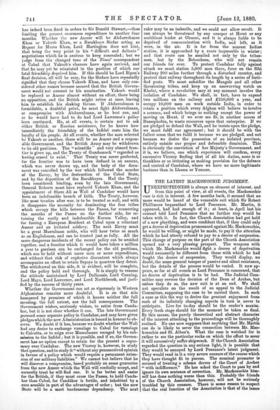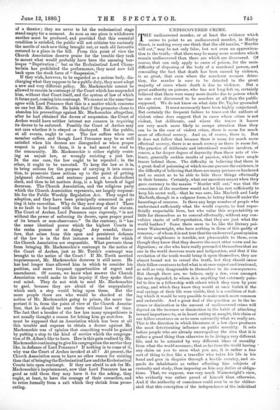THE LATEST MACKONOCHIE JUDGMENT.
UNEXPECTEDNESS is always an element of interest, and from this point of view, at all events, the Mackonochie case is rich in interest. A few months back, it seemed that no more would be heard of the venerable suit which Sir Robert Phillimore bequeathed to Lord Penzance. Mr. Martin, it appeared, had had enough of it ; at least, in April last his counsel told Lord Penzance that no further step would be taken with it. In fact, the Church Association had got hold of a new plaything, and were confident that, if they could only get a decree of deprivation pronounced against Mr. Mackonochie, he would be willing, or might be made, to pay it the attention which he had utterly refused to pay to a decree of suspension. This change of purpose on the part of the Church Association opened out a very pleasing prospect. The weapons with which Mr. Mackonochie would fight a decree of deprivation would necessarily be different from those with which he had fought the decree of suspension. They would display, no doubt, the same general temper of passive and silent resistance, but the details of the process would be varied. It now ap- pears, so far at all events as Lord Penzance is concerned, that no decree of deprivation is to be had. The Judicial Com- mittee may reverse the decision of the Dean of Arches, but unless they do so, the new suit is at an end. We shall not speculate on the result of an appeal to the Judicial Committee, supposing the case to be carried there. In such a case as this the way to derive the greatest enjoyment from each of its infinitely changing aspects in turn is never to anticipate. Live for to-day should be the reader's maxim. Every fresh stage should for the moment be taken as final. By this means, the purely theoretical and abstract character of the interest attaching to the proceedings will be thoroughly realised. No one now supposes that anything that Mr. Martin can do is likely to sever the connection between Mr. Mac- konochie and St. Alban's. What the case is watched for is rather to see the particular rocks on which the effort to sever it will successively suffer shipwreck. If the Church Association regarded the question in any serious light, it is possible that they would be annoyed by Lord Penzance's latest judgment. They would read in it a very severe censure of the course which they have thought fit to pursue. The nominal promoter is accused of treating a solemn decree of the Court of Arches "with indifference." He has asked the Court to pass by and ignore its own sentence of correction. Mx. Mackonochie him- self has done nothing worse than this. Probably the friends of the Church Association, however, will not be seriously troubled by this censure. There is some reason to suspect that the real function of the Association is that of the lessee
of a theatre ; they are never to let the ecclesiastical stage stand empty for a moment. As soon as one piece is withdrawn another must be produced, and provided that this essential condition is satisfied, the public will not criticise too curiously the merits of each new thing brought out, or each old, favourite restored to a place in the bill. From this point of view the Church Association deserve praise for the trouble they took to mount what would probably have been the amusing bur- lesque "Deprivation ;" but as the Ecclesiastical Lord Cham- berlain has prohibited the performance, they must now fall back upon the stock farce of "Suspension."
If they wish, however, to be regarded as a serious body, dis- charging what they suppose to be a public duty, they must adopt a new and very different policy. Mr. Mackonochie cannot be allowed to remain in contempt of the Court which has suspended him, without that Court itself, and the system of law of which it forms part, coming into contempt. We cannot at the same time agree with Lord Penzance that this is a matter which concerns no one but Mr. Martin. He holds that if the promoter chose to abandon his proceedings against Mr. Mackonochie altogether, after he had obtained the decree of suspension, the Court of Arches would have neither interest nor concern in requiring its decree to be enforced. Possibly the Court of Arches may not care whether it is obeyed or disobeyed. But the public, at all events, ought to care. The law suffers when one member suffers, and though Lord Penzance may be as well satisfied when his decrees are disregarded as when proper respect is paid to them it is a bad moral to read to the community. Mr. Mackonochie is either rightly resist- ing an unjust law, or wrongly resisting a just law. In the one case, the law ought to be repealed ; in the other, it ought to be executed. To keep the law as it is, to bring actions for the purpose of carrying it into execu- tion, to prosecute these actions up to the point of getting judgment delivered, and sentence passed on a disobedient clerk, and then to let matters drop, is a high breach of legal decorum. The Church Association, and the religious party which the Church Association represents, are largely responsi- ble for the Public Worship Regulation Act. They urged its adoption, and they have been principally concerned in put- ting it into execution. Why do they now stop short? There is no fault to be found with the machinery of the statute. The Court of Arches, Lord Penzance says expressly, "is not without the power of enforcing its decree upon proper proof of its breach or non-observance." On the contrary, it "has the same identical power which the highest Courts in the realm possess of so doing." Any scandal, there- fore, that arises from this open and persistent defiance of the law is in the first instance a scandal for which the Church Association are responsible. What prevents them from bringing Mr. Mackonochie's contempt to the notice of the Court of Arches, just as Mr. Tooth's contempt was brought to the notice of the Court ? If Mr. Tooth merited imprisonment, Mr. Mackonochie deserves it still more. He has had longer time allowed him in which to consider his position, and more frequent opportunities of regret and amendment. Of course, we know what answer the Church Association would make to this inquiry if they spoke their
real mind. They do not wish to send Mr. Mackonochie to gaol, because they are afraid of the unpopularity which such a step would bring upon them. But the more people there are who would be shocked at the notion of Mr. Mackonochie going to prison, the more im- portant it is, from the point of view of the Church Associa- tion, that he should be sent there without loss of time. The fact that a breaker of the law has many sympathisers is not usually thought a reason for letting him go scot-free. It must be supposed that an Association which has been at all this trouble and expense to obtain a decree against Mr.
Mackonochie was of opinion that something would be gained by putting a stop to the kind of service which the congrega- tion of St. Alban's like to have. How is this gain realised by Mr.
Mackonochie continuing to give his congregation the service they like, in defiance of Lord Penzance I If nothing is to come of it, why was the Court of Arches invoked at all ? At present, the Church Association seem to have no other reason for existing than that of bringing the Ecclesiastical Law and the Ecclesiastical Courts into open contempt. If they are afraid to ask for Mr.
Mackonochie s imprisonment, now that Lord Penzance has as good as told them they may have it for the asking, they ought, at least, to have the courage of their cowardice, and to retire formally from a suit which they shrink from prose- cuting.



































 Previous page
Previous page